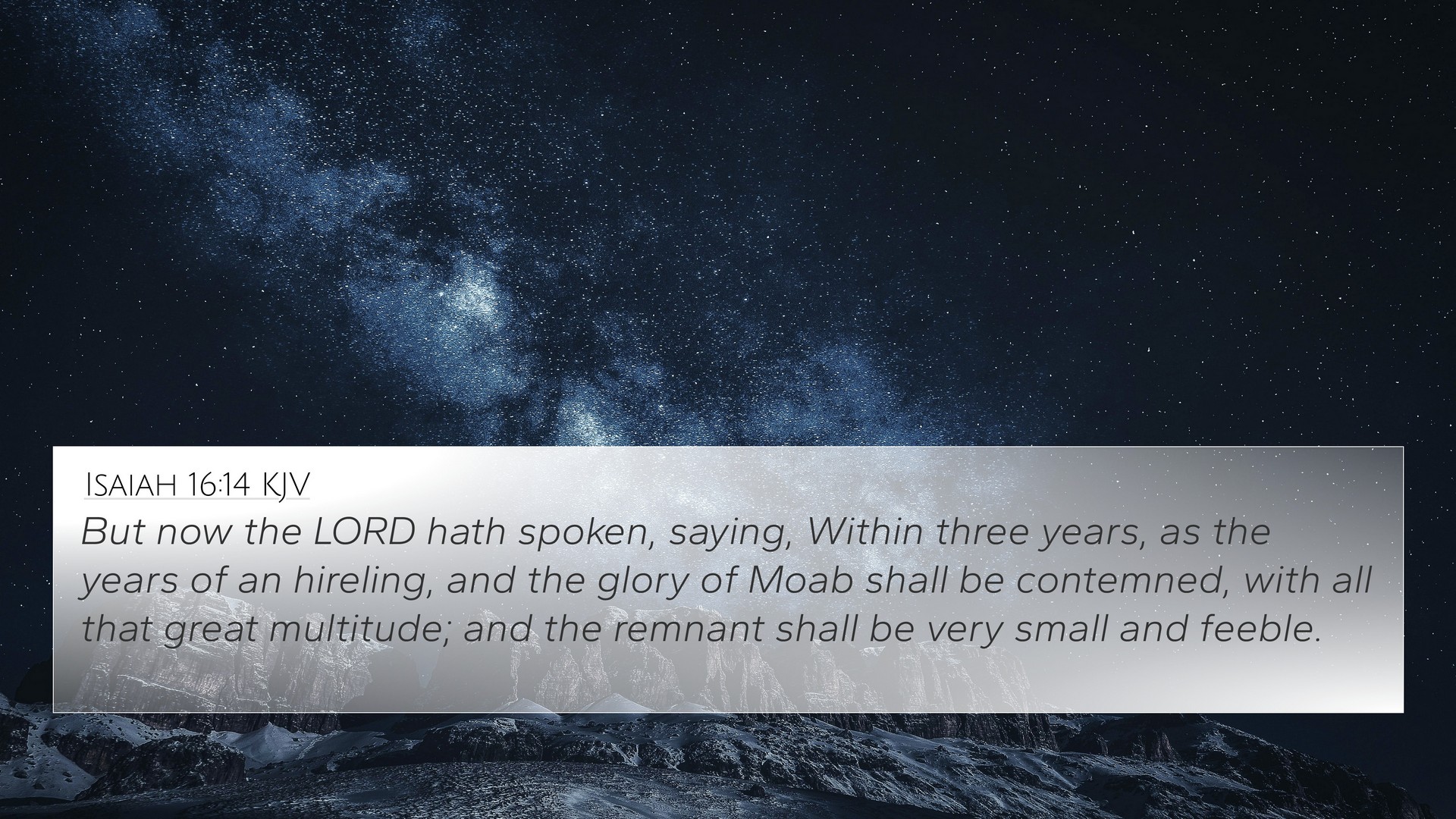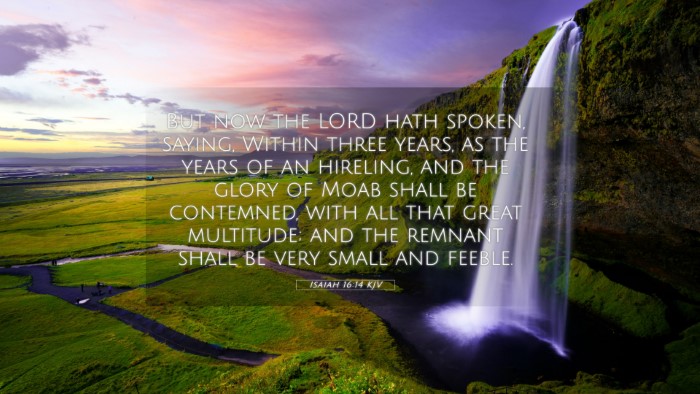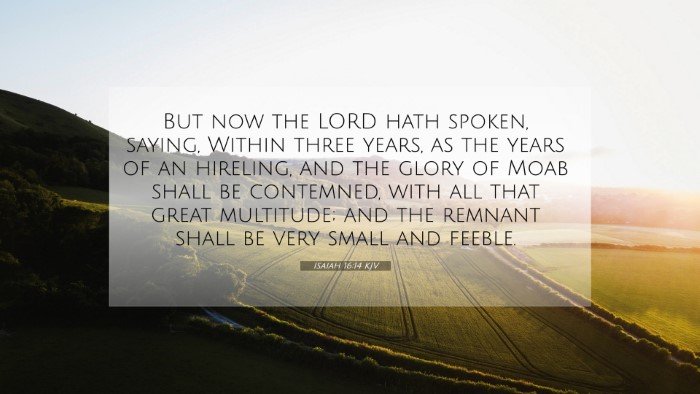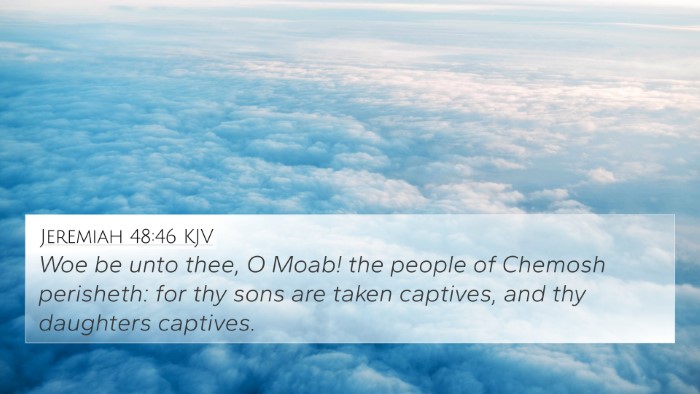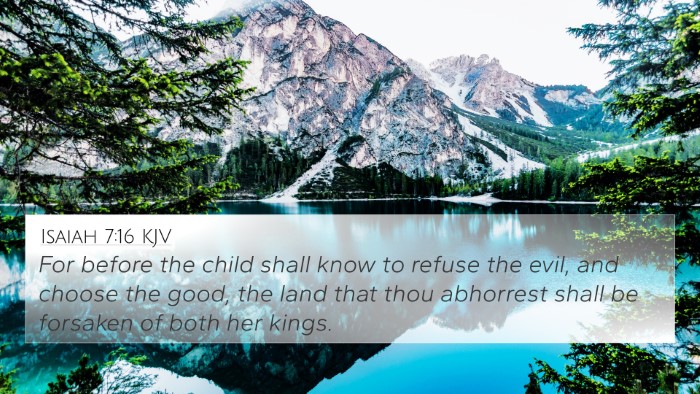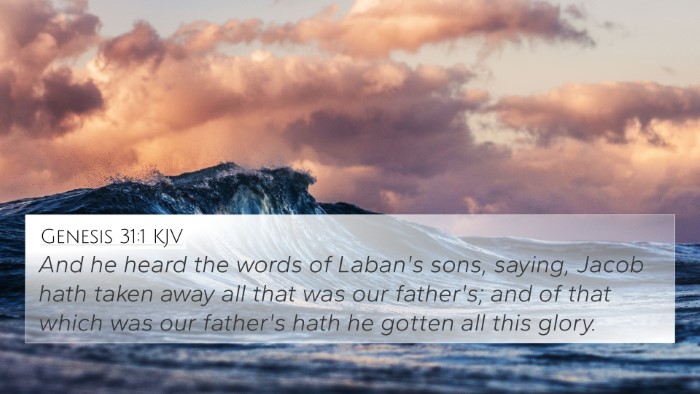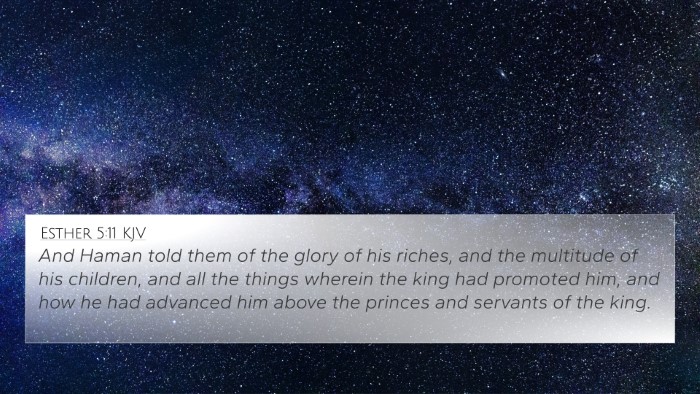Understanding Isaiah 16:14
Isaiah 16:14 states: "But now the Lord has spoken, saying, 'Within three years, as the years of a hired man, the glory of Moab will be brought into contempt, with all the great multitude; and the remnant will be very small and feeble.'" This verse captures God's judgment on Moab, signifying a prophetic insight into the nation's fate.
Contextual Background
The Book of Isaiah, attributed to the prophet Isaiah, addresses the people of Israel and surrounding nations. In this particular passage, God communicates a message regarding Moab, a nation that historically opposed Israel. The context reveals impending doom, emphasizing God's sovereignty and His ability to dismantle prideful nations.
Commentary Insights
-
Matthew Henry's Commentary:
Henry notes that Moab's glory will fade as a judgment for its pride and idolatry. This prophecy serves as a warning to all nations about the transient nature of earthly glory judged by God’s standards.
-
Albert Barnes' Notes:
Barnes emphasizes the immediacy of the prophecy, highlighting the specific timeframe assigned by God. This timeline indicates a decisive, unavoidable reckoning for Moab, demonstrating God's control over historical events.
-
Adam Clarke's Commentary:
Clarke elaborates on the significance of 'the hired man' analogy, suggesting that just as a laborer expects payment after a short term, Moab’s time of reckoning is near. This insight serves as a reminder that God's judgments are meted out timely.
Theological Significance
This verse reveals profound truths about divine justice and the fulfillment of God's word. It signifies that no matter how powerful or prosperous a nation may appear, it ultimately stands under God's authority. The foreshadowing of Moab's downfall illustrates how God interacts with nations based on their faithfulness or rebellion.
Cross-References
Several Bible verses enhance our understanding of Isaiah 16:14:
- Jeremiah 48:2: "There is no longer a praise of Moab." This cross-reference underscores the judgment Isaiah predicts.
- Isaiah 25:10: "For on this mountain, the hand of the Lord will rest." This reflects the ultimate triumph of God over nations and His protection over His people, paralleling the themes within Isaiah 16.
- Amos 2:1: "Thus says the Lord: For three transgressions of Moab, and for four, I will not revoke the punishment." God’s judgments are systematic and just.
- 2 Kings 3:24: "And when they came to the camp of Israel, the Israelites rose and struck the Moabites." This passage shows the conflict between Israel and Moab, reinforcing the historical context of Isaiah's prophecy.
- Micha 5:6: Discusses judgments on nations, similar to Isaiah's theme of divine justice.
- Psalm 60:8: "Moab is my washbasin." This verse symbolizes the lesser status of Moab in God’s eyes.
- Isaiah 15:1: Relates directly to Moab's fate, providing context for the prophecy about their destruction.
- Romans 9:17: "For the Scripture says to Pharaoh, 'For this very purpose I have raised you up...'" This connects the theme of God’s sovereignty over nations.
- Revelation 18:2: Discusses the judgment of great cities, akin to Moab, demonstrating the consistency of God’s judgment throughout Scripture.
- Ezekiel 25:8-11: Pronounces judgments against Moab, supporting the message of Isaiah and showing God’s consistent dealings with nations.
Connections to Other Scriptures
This passage in Isaiah links thematically with other scriptures throughout both the Old and New Testaments, emphasizing God's ultimate authority and the transience of earthly glory. Understanding these connections through cross-referencing enhances one's grasp of Biblical themes.
Exploring Thematic Connections
The themes of judgment, sovereignty, and the fall of nations resonate throughout both Testaments, and studying these connections offers a deeper insight into God’s character and expectations for His people.
Conclusion: The Importance of Cross-Referencing
In summary, Isaiah 16:14 serves as a poignant reminder of God’s judgment against prideful nations. By utilizing cross-reference tools and exploring connections with related scriptures, readers can gain a more comprehensive understanding of Biblical themes and their relevance to modern spiritual reflections.
